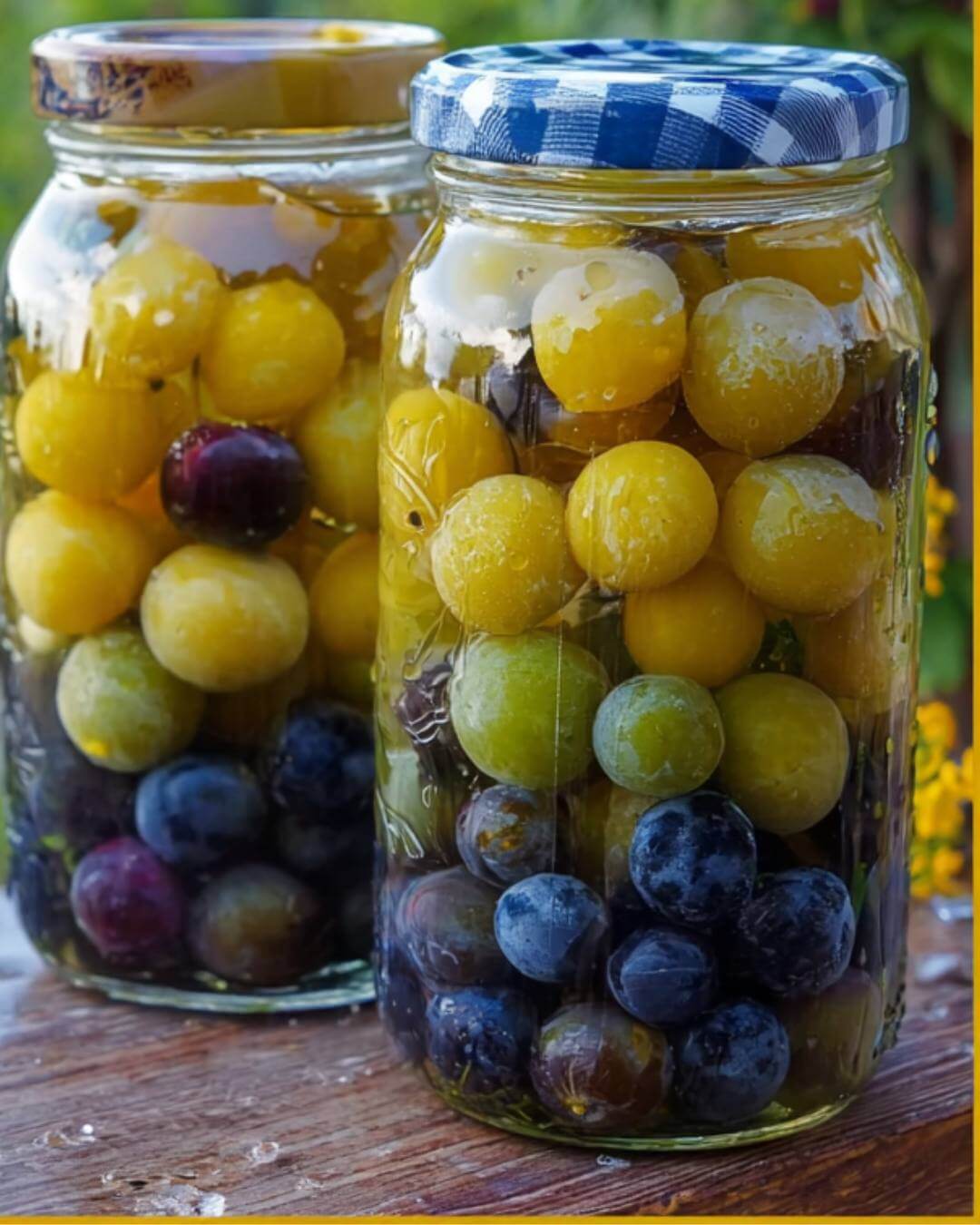Preserved Grapes in Jars – Simple Water-Pack Method for Year-Round Enjoyment

Experience the sweet taste of fresh grapes even in the depths of winter with this straightforward preservation method that captures the fruit at its peak ripeness. This traditional canning technique requires only grapes, water, and a touch of sugar to create beautiful jars of whole grapes that maintain their natural flavor and texture for months. Unlike complicated preserving recipes with numerous ingredients, this minimalist approach lets the pure grape flavor shine through while extending the enjoyment of harvest season well beyond autumn. Whether you use white, red, or black grapes, or create colorful layered jars mixing varieties, this simple preservation method works beautifully with any sweet table grape. Perfect for adding to fruit salads, serving as a unique dessert, or simply enjoying straight from the jar on cold winter days.
Ingredients
- 2-3 kg (4.4-6.6 lbs) fresh ripe grapes (any sweet table variety such as white seedless, black seedless, or red grapes)
- Filtered water, as needed
- 3-4 tablespoons granulated sugar (15g/½ oz per 500ml jar)
Instructions
Step 1: Select and Prepare Grapes Choose ripe, sweet, firm grapes without bruises or soft spots. Wash the grape clusters thoroughly under cold running water. Gently remove individual berries from the stems, discarding any damaged or underripe grapes. Sort by variety if desired.
Step 2: Sterilize Jars Wash glass jars and lids in hot soapy water and rinse well. Place them in a large pot of boiling water for 10 minutes to sterilize, or run through a dishwasher cycle. Let them drain on a clean towel.
Step 3: Pack the Grapes Fill each clean jar with grapes all the way to the top, packing them snugly but gently to avoid crushing. You can use one variety per jar or create attractive layers alternating white and dark grapes.
Step 4: Add Sugar Add 1 tablespoon of sugar to each 500ml (1 pint) jar. For larger 1-liter jars, use 2 tablespoons of sugar.
Step 5: Fill with Water Pour clean filtered or boiled and cooled water into each jar, covering the grapes completely and filling to within 1cm (½ inch) of the rim. The sugar will dissolve during the heating process.
Step 6: Seal the Jars Wipe the jar rims clean with a damp cloth to ensure a proper seal. Place the lids on tightly, securing them firmly.
Step 7: Prepare Water Bath Place a large pot on the stove and fill it with enough water to cover the jars when they’re placed inside. You can place a kitchen towel or rack at the bottom to prevent the jars from directly touching the pot bottom.
Step 8: Process the Jars Carefully place the sealed jars into the pot of water, ensuring they’re fully submerged. The water should cover the lids by at least 2-3cm (1 inch). Bring the water to a rolling boil.
Step 9: Boil and Time Once the water reaches a full boil, maintain the boil for 5 minutes. This brief processing time is sufficient to preserve the grapes while keeping them whole and intact.
Step 10: Cool Down Turn off the heat and leave the jars in the hot water until everything cools down completely, which may take several hours. This gradual cooling helps create a proper vacuum seal.
Step 11: Check Seals Once cooled, remove the jars from the water. Check that the lids have sealed properly by pressing the center of each lid. It should not flex or pop. If any jars didn’t seal, refrigerate and consume within a week.
Step 12: Store Transfer the properly sealed jars to a cool, dark, dry place such as a pantry, cellar, or basement. Do not refrigerate unless opened.
Step 13: Wait and Enjoy While the grapes are technically ready to eat after a few days, they’re best enjoyed during winter months when fresh grapes aren’t available. The preserved grapes will keep for 6-12 months when stored properly.
Time and Servings
Prep Time: 30 minutes Processing Time: 5 minutes Cooling Time: 3-4 hours Total Time: 4 hours Yield: 4-6 x 500ml jars (approximately 24-36 servings)
Nutrition Per Serving (½ cup): Approximately 70 calories, 0.5g protein, 18g carbohydrates, 0g fat, 1g fiber
Why Preserved Grapes Are Worth Making
Preserving grapes in jars allows you to enjoy the nutritional benefits of this fruit year-round. Grapes are rich in antioxidants, particularly resveratrol and flavonoids, which support heart health and may have anti-inflammatory properties. They provide natural sugars for quick energy along with vitamin C, vitamin K, and potassium. This preservation method maintains most of the fruit’s nutritional value while extending its shelf life significantly. The minimal processing and brief cooking time help retain the grapes’ natural nutrients better than many commercial preservation methods. By making your own preserved grapes, you control the sugar content, avoid artificial preservatives and additives, and reduce food waste by preserving surplus fruit at peak ripeness. This traditional technique connects you to time-honored food preservation practices while providing a special homemade treat that brings the taste of summer to winter tables.
